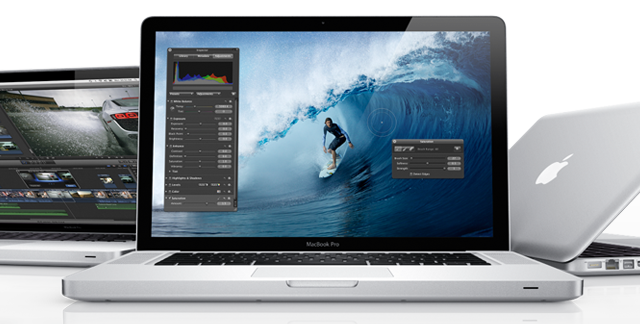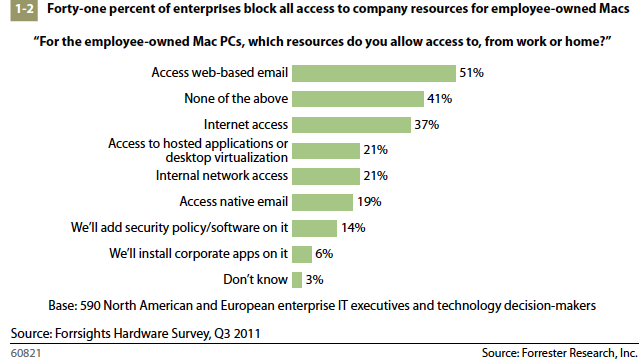
Forty-one percent of enterprises do not allow employee-owned Macs access to any company resources, even Web-based e-mail, according to the results of a new Forrester survey of IT executives at North American and European companies.
Forrester asked 590 IT executives and technology decision-makers if employee-owned Macs are granted access to resources like Web-based e-mail, hosted applications and virtual desktops, internal networks, and native e-mail applications. Forty-one percent answered “none of the above.”
Individual items on the list saw varying levels of support: six percent say they will install corporate applications on employee-owned Macs; 14 percent will install security software on user-owned Macs; 19 percent allow access from native e-mail applications; 21 percent allow access to the internal network; and another 21 percent are OK with Macs accessing virtual desktops and applications. Thirty-seven percent allow Internet access and 51 percent say Web-based e-mail is allowable, with the discrepancy suggesting some companies allow access to a Web-based e-mail client but not public websites.

The Forrester report only talks about employee-owned Macs, so it doesn’t take into account the fact that some businesses would block access from any employee-owned computer or device. But in response to this question from Ars, Forrester tells us that its research shows only 32 percent of companies block all access from employee-owned Windows PCs.
Forrester says Macs in particular have an unfair reputation among the enterprise as not being business-worthy, as noted by the title of its report, “People are bringing Macs to Work—It’s time to repeal prohibition.” While Mac sales to businesses have improved, perhaps because of corporate success of the iPhone and iPad, Mac OS X still holds a larger share of the consumer market than of the enterprise market.
So employees who want to use Macs instead of Windows may have to buy the computers themselves. This is both because Macs tend to be pricey and because of corporate policies. As Forrester analyst David Johnson puts it in the report, “End user computing professionals steeped in two decades of Microsoft management traditions are either prohibiting Macs on the company network or limiting their support to executives only.” Forrester, which conducted interviews as part of its report, said only one company it spoke with is offering a MacBook as a company-paid option, but others do offer stipends giving employees some of the money needed to buy an Apple computer.
Supporting Macs is a challenge for Windows shops
Forrester notes that Macs pose technology challenges to IT shops accustomed to Windows. But these challenges can be overcome, and giving employees more choice will improve productivity, Forrester says. “There is a correlation between innovative, productive company performance and personal freedom for personal computing choices,” the report states.
Mac users who must access Windows applications can use Parallels or VMware Fusion virtual machines, but Forrester said this should be treated as a stopgap on the way to an infrastructure that accommodates both Windows and Mac OS X. Forrester said one large technology vendor in Silicon Valley (not Apple) with more than 5,000 Macs offers standard Mac images with preloaded software, antivirus and group policy integration for enforcing passwords and screen saver policies, and “made configuration changes to core business applications such as Microsoft Exchange Server” to ensure compatibility.
The firm also notes that IT can and should ask end users to take responsibility for their machines and adapt to the corporation’s legitimate needs. “Keep the majority of responsibility in the end user’s hands, but implement tools such as image deployment, group policy integration, and Windows file sharing utilities to prevent hangovers once the party’s over,” Forrester says. “As an IT professional, you need to be seen as a consummate service professional and find innovative ways to add value. You can’t afford to be seen as an obstacle to productivity, but you can certainly ask revolutionaries to do their part, as long as you explain what that is.”
Driven by power users, Macs make inroads into the enterprise
The Forrester survey also found that 22 percent of enterprises are seeing a significant increase in use of employee-owned Macs. The bans on activities like accessing e-mail “leaves a lot of employees to find their own ways to get around corporate prohibition.” Johnson talks about a class of employees who are “addicted” to being productive, and are frustrated by corporate PCs “saddled with management, backup and security agents” slowing things down. “They’re drawn to uncluttered Macs—especially those with solid-state drives, which are more responsive and boot in seconds,” Johnson writes.
While Johnson didn’t go so far as to say that Mac users are more productive than Windows users, he did write that employees who seek out new technologies tend to be more productive and serve customers more effectively. “Most of the Macs today are being freewheeled into the office by executives, top sales reps, and other workaholics,” he writes. Johnson recommends that businesses ease Macs into the organization with “a self-supporting community of Mac users” who can help IT publish how-to guides and helpful documents addressing basic needs like e-mail configuration and VPN access.
Still, some Mac-specific management software may be needed. Instead of using “incomplete extensions to Windows management tools,” businesses may need a parallel infrastructure for managing Macs to handle software packaging, automated e-mail client configuration, image deployment and patching.
File sharing is still an issue as well. “After nearly 20 years, you’d think Windows file sharing would ‘just work’ with other platforms, given that the information people want to share across the enterprise belongs to them and not to Microsoft,” Johnson writes. “But you’d be wrong.There are still frustrating problems with file permission carry-through from network file shares to Macs and vice versa, and the symptoms are dropped connections to Windows file shares, unexpected file locking, and nonfunctional Mac searching across Windows shares. GroupLogic makes a tool that solves most of these problems.”
While new management requirements may seem daunting to under-funded IT departments, Johnson claims technology departments that stand in the way “will eventually get run over.” Ars has been making similar points about consumer technologies in general as part of our “Consumerization of IT” series, in which we’ve looked at the impact of smartphones, tablets, social networking, rapid browser releases, and other trends on enterprise technology.
UPDATE: Many readers see little difference in 32% of IT shops blocking Windows PCs, and 41% blocking Macs. We originally characterized this as "IT hating on Macs," using a familiar colloquialism to indicate that Macs receive an extra share of scorn from network operators. We view the 28% difference between these numbers as significant. Regardless, the point of research from Forrester is broader than any specific number, and we regret that the headline detracted from the many other aspects of this article that are substantive.
reader comments
455